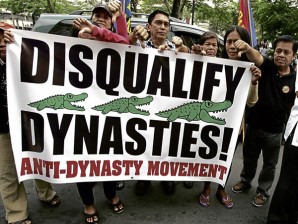Another petitioner loses fight vs political dynasties

ANTIDYNASTY MOVEMENT Members of a group against political dynasties stage a rally at the Commission on Elections to call for the disqualification of the children of government officials running for senator in the May elections. The Supreme Court earlier denied a petition to compel the Comelec to ban members of political dynasty from running in the May elections. NIÑO JESUS ORBETA
MANILA, Philippines -The Supreme Court on Tuesday dismissed another petition that sought to ban political dynasties in the Philippines.
In an en banc (full court) session, high court justices said they cannot compel the House of Representatives and Senate to pass a law that would define “political dynasties.”
“[Ricardo]Penson petition for mandamus on political dynasties denied for same reason as the Biraogo petition,” the high court’s Public Information Office said in a text message.
The high court last month threw out Louis “Barok” Biraogo’s petition asking that it compel the Commission on Election to enforce the prohibition against political dynasties.
The high court said, since there is no enabling law, Comelec cannot be compelled to enforce the prohibition.
Senatorial candidate Ricardo Penson, on the other hand, wants the high court to compel both the Senate and the House of Representatives to enact a law that would prohibit political dynasties.
In a 20-page petition, Penson said while the 1987 Constitution, particularly Section 26 prohibits political dynasties, such provision is not self-executing thus there need to be a law enacted to define “political dynasties.”
However, Penson said it has been over 20 years since the Constitution took effect, but the chambers of Congress have yet to enact a law against political dynasty.
But still, the high court, in reiterating its ruling on Biraogo, said mandamus is not applicable on the Penson petition. It noted that mandamus is applicable only to ministerial duties. Ministerial duties refer an act or duty which an officer or tribunal performs in a given state of facts, in a prescribed manner, in obedience to the mandate of a legal authority.
“Essential, therefore, to its issuance is a clear legal right of petitioner to the thing demanded and an imperative duty on the part of the respondent to perform the act required, which do not obtain in this case,” the high court said.














